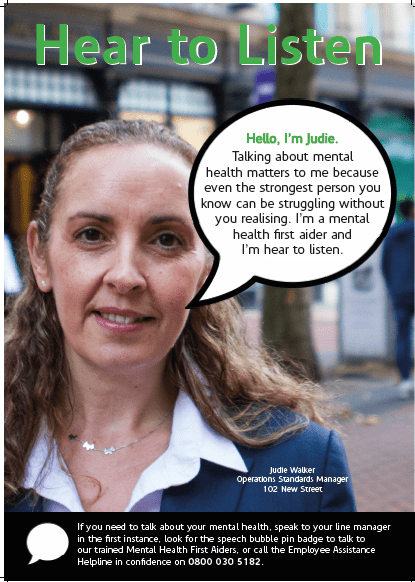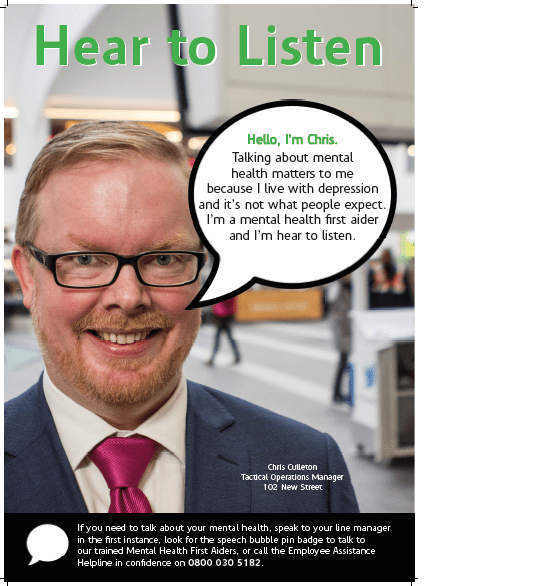 It is the 10th anniversary of Mental Health First Aid (MHFA) in England this week, but it is only in the last couple of years that this training has become the main game in town for organisations wishing to start a mental health programme. Heather Beach assesses the scheme.
It is the 10th anniversary of Mental Health First Aid (MHFA) in England this week, but it is only in the last couple of years that this training has become the main game in town for organisations wishing to start a mental health programme. Heather Beach assesses the scheme.
Courses
MHFA involves either a two day course, which certifies you as Mental Health First Aider (MHFAider), a one day course, which means you’re an MHFA Champion or a half day course making you MHFA Aware.
This training isn’t, however, brand new. In fact, before it came to England in 2007, MHFA had been around since the year 2000 in Australia, where the movement first started.
The growing interest in mental health in society and in business has meant that people are looking for answers. In January, prime minister Theresa May identified MHFA as being the programme she wanted for schools, and last year Norman Lamb MP tabled an early day motion in the House of Commons calling for first aid regulations to be amended to include mental health, thereby adding his weight to the MHFA camp.
Construction industry
 MHFA courses have also been included more recently as part of mental health programmes in the construction industry.
MHFA courses have also been included more recently as part of mental health programmes in the construction industry.
There are many other programmes available, but MHFA has an evidence base to show that it works in what it sets out to do.
What is mental health first aid and what does it do?
Training as an MHFAider involves a two day course, administered and run by MHFA England, which is a community interest company (CIC). Courses are led by trained instructors, and each course can have up to 16 people on it.
Courses are often run in-house – some organisations train one of their own team to be a trainer and, for smaller organisations or individuals, there are also open courses available to book via the MHFA England website.
It will train nominated individuals in your organisation to:
- Spot the signs and symptoms of a mental health issue
- Listen and support non-judgementally, as well as assess for severe crisis
- Provide reassurance and hope for recovery
- Signpost to self-help or professional support
A further benefit of MHFA training is that it reduces stigma and raises awareness of participant’s own and other’s mental health and mental ill health. It’s important to note, however, that it does not train people to be therapists
Martin Coyd from Mace, an early supporter of MHFA’s work says: “A sudden awareness of Mental Health happened to my community by accident, following the suicide of a hero. Amazingly, other heroes stood and had the courage to ‘come out’. There was a sudden realisation that we have a problem, another realisation was that we could do something.
“Mental Health First Aid is supporting the Rugby League family and the communities who belong. The same skills and tools are beginning to support the construction industry family and will make a huge difference.”
Why mental health?
 There is such a strong argument for organisations and society to tackle mental health, that when we look at the stats, we wonder why this is such a new concern.
There is such a strong argument for organisations and society to tackle mental health, that when we look at the stats, we wonder why this is such a new concern.
The productivity argument
People who feel they are valued and able to speak about what concerns them, buy into you and your business and provide better results, as has been proven in numerous studies.
What could you do if your sickness absence was reduced? The enormous 40% of sick leave taken by those with stress related issues just overtook musculoskeletal disorders as the top reason for sickness absence in the HSE’s ill health stats.
It takes an average of 23.9 days to resolve sick leave for stress – and as we all know, these cases can drag on for months and months.
There is a human argument.
 5,668 people took their own lives in Great Britain in 2016. There were 1,792 killed in road traffic accidents and 137 fatalities at work. When we see these three stats together, we may wonder why mental health hasn’t benefited from the same focus as these two areas.
5,668 people took their own lives in Great Britain in 2016. There were 1,792 killed in road traffic accidents and 137 fatalities at work. When we see these three stats together, we may wonder why mental health hasn’t benefited from the same focus as these two areas.
As with accidents at work, where organisations have had a member of their team take their own life there is a sense of collective guilt and concern. Who wants to feel that they had any part in creating an environment where this was possible?
Whilst the statistic 1 in 4 is widely publicised as being the number of people who suffer from a mental health issue in any given year, I think this figure should be treated with some suspicion based on the way it was collected. What we do know is that if we look to ourselves, our families, our friends, we ALL know someone who is suffering or who has suffered.
Having suffered twice with anxiety and depression myself – not work-related (and consider myself not only fully recovered, but a better person for the experience!) – I know I would much rather have a physical illness than go through that again.
Who doesn’t want to create a working environment in which people thrive and are able to be their best selves rather than one in which they suffer? Who doesn’t, in theory at least, see the argument for giving physical and mental health parity of esteem? The problem is that you can see a physical health issue and you know what to say to someone who is suffering. Where mental health is concerned, it is a different issue….
What is the point of running or being part of a business which does not want to facilitate the people inside it being happy? Yes, shareholder value and economics are important – we all need a certain amount of money not to have to worry too much about it, but surely at least part of the point of business should be to serve its employees?
There is a legal argument
Of course, all employers have legal responsibility under the Health and Safety at Work Act 1974 and Management of Health and Safety at Work Regulations 1999 to ensure the health safety and welfare at work of their employees. This includes minimising the risk of stress-related illness or injury to employees.
However, in the UK at least, you are more likely to find that it is the Equalities Act 2007 which causes you to land up in a tribunal as a result of a stress case. Disability discrimination now sits under this act and a mental health issue can absolutely be considered a disability.
There is lots of case law here which your HR team will be aware of. It is in their interests to ensure managers understand this, that your organisation has a wellbeing policy and that people inside it are trained to deal with a mental health issue.
Considerations when implementing Mental Health First Aid
Please do not just implement MHFA and think you have “done” mental health.
It is a sustained campaign across all levels:
Managers
 HSE, CIPD and indeed all research agrees that good management and leadership are key to a mentally healthy organisation. Imagine you appoint MHFAiders and do not give your managers the basic understanding of how to manage stress and mental health in their own teams? Is this really going to impact the climate you want to create? And yet many people do this.
HSE, CIPD and indeed all research agrees that good management and leadership are key to a mentally healthy organisation. Imagine you appoint MHFAiders and do not give your managers the basic understanding of how to manage stress and mental health in their own teams? Is this really going to impact the climate you want to create? And yet many people do this.
I (as well as others, including MHFA England) do run a one day people-managers course which covers the basics of spotting the signs, having the conversation, managing sickness absence as well as the conditions for having a team which thrives (including some self-awareness).
I have run my course with London Midland, Man Truck and Bus, and UBM among others.
Peer to peer training
This would be the MHFA Two Day course.
General mental health awareness training
This should cover an awareness of what mental health is, what good mental health looks like and some basic resilience training for your teams. You can enhance this with an understanding of mindfulness and other stress management techniques. But again, don’t just do this – that is like giving out PPE without looking at the unsafe conditions.
An organisational approach
If you don’t look at your policies and processes when you implement a mental health programme, you run the danger of not walking the talk. When someone goes off sick with stress what does the policy say about how they are treated for example?
Tom Oxley at Bamboo consulting helps organisations do this.
He says: “Your best source of information on how to support your people are already working for you. They’re the ones who’ve been off, fought the beast and survived. They’ll have golden feedback about managers’ ability, your processes, policies and communications. Ask them and get ready to listen. It’s vital you balance MHFA with a strategic approach involving accountable leaders, trained managers and expertise in the right places – be that OH, HR, H&S or the board”
Get leaders talking about it
The most powerful message is when one of your senior leaders is prepared to talk about their own experiences. This really creates a completely different environment as it gives people permission to tell their own stories.
Don’t just do it once! You need to continually communicate
You might want to kick off with a wellbeing week, or an internal conference, but keep the momentum going.
How do you administer a Mental Health First Aid programme?
In the main, organisations do have two approaches to this.
Either they officially appoint and publicise MHFAiders, or they just train as many people as possible, let it be known they are doing training, but don’t officially announce…
There are pros and cons to both approaches. Lesley Heath, Head of HSE for London Midland, chose the former and she decided to use senior managers to go through the training first to demonstrate commitment.
She says: “We decided to show we were taking it seriously by ensuring we had the equivalent competent qualified first aiders as we do physical first aiders and we felt by appointing them as Mental Health First Aiders, we were giving more kudos than just raising awareness”.
Selection
Clients sometimes have concerns over selection – should they allow people to self-select? Does this always get the best people? These may be legitimate concerns to some degree, and whilst I can see an argument for ensuring there are representatives from different areas of the business, I think people generally have a nose for ensuring they speak to someone they can trust.
Consider support for your MHFAiders.
Sometimes your first aiders may have difficult conversations they take home with them. The course manuals provided by MHFA England are an excellent ongoing support resource, as is their Line Mangers guide, and their website has lots of useful resources to support MHFAiders.
However you will still need to consider whether they work together to support each other, whether they use the EAP, or whether there is something else you can put in place to ensure your duty of care to them does not get compromised.
How do you find a trainer?
If you approach MHFA England directly, they will help to find you an associate trainer who will specialise in teaching MHFA in a workplace context. There are also many excellent trainers operating under their own steam who are not associates and who you can find on Linked-In or via the MHFA England website.
Consider that, as with any qualification (like Managing Safely), the course is highly scripted with a lot of slides and you will want someone who can keep participants engaged, so I would suggest talking to clients of the person who has delivered the course previously, or use someone you know will do this.
It may be worth considering the background of the trainer too – many MHFA trainers have a background in mental health and can give you a great deal of background on various mental illnesses.
My personal preference is to work with trainers who understand how organisations work and have had practice in lots of difficult conversations, because most of my business is in corporates. So if, for example, you wanted to speak to us about training your company, my background is as a senior manager in a large corporate myself and Lauren, my other trainer, has a background in construction health and safety training.
In Summary
There is a danger that mental health is being talked about so much that people are starting to consider it is the latest fad and it will be something else tomorrow.
Here’s a comment from someone who has been making a difference in this area for a while – Brian Donnachie from ISG: “For the past 12-18 months, the subject of mental health has very much been in vogue. Significant media attention coupled with industry, a proliferation of celebrities and even the royal family openly committing to addressing mental health illness provides an indication of the increased status of mental health within society.
“We must build on this momentum to ensure long term improvements in the area of mental health are achieved and not allow recent efforts to be seen as simply yet another short term campaign. Tackling mental health is not a campaign, but a long term commitment to creating environments conducive to mental well-being.”
I don’t think this is a short term thing. In a society where you are more likely to die of over-eating than famine, of suicide rather than being killed by someone else’s hand, an interest in how we increase our happiness as a society, is likely to be a long term debate.
MHFA is a great start for your organisation – but please don’t stop there.
To find out more about MHFA England and its training visit: mhfaengland.org/organisations/workplace
Heather Beech runs The Healthy Work Company which can deliver MHFA 2 day courses and a Stress Management for Managers course. If you would like more information, please contact her on: [email protected]
What makes us susceptible to burnout?
In this episode of the Safety & Health Podcast, ‘Burnout, stress and being human’, Heather Beach is joined by Stacy Thomson to discuss burnout, perfectionism and how to deal with burnout as an individual, as management and as an organisation.
We provide an insight on how to tackle burnout and why mental health is such a taboo subject, particularly in the workplace.







Excellent piece from Heather. It sets out clearly the challenges and several practical ways to address Mental Health issues in the workplace. This is a topic that needs not just attention but real action. Thank you Heather!
I have been looking at the academic workplace stress literature to try and get a better feel for the size of the MH problem. Meta-analytic studies involving millions of people show there is no clear statistically significant relationships between workplace stress and actual outcomes such as cancer (Heikkilä,et al, 2013), diabetes (Sui, 2016), coronary heart disease (Virtanen, 2103) or sickness absenteeism (Darr & Johns, 2008). Conversely, symptoms of psychological stress are over reported in nearly all “stress” surveys (Goodwin et al.,,2103). Such independent results, as I have been arguing, again point to the size of the MH problem being over-stated,… Read more »
Having spent the past two days completing the MHFA England Mental Health 1st Aid course I can only commend this course to others.
Thought provoking, empowering and enabling.